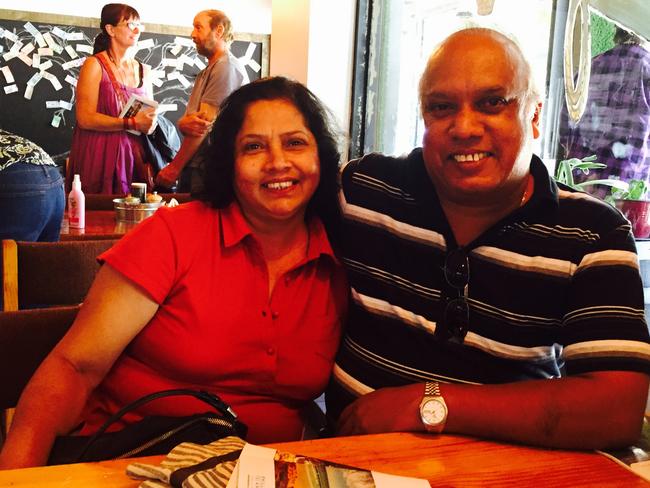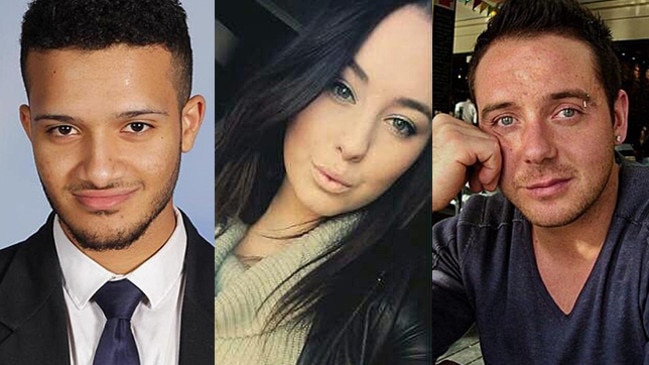Melbourne thunderstorm asthma victim dies eight days after 70-minute ambulance wait
LATEST: THE world’s worst thunderstorm asthma crisis in Melbourne has been likened to 150 bombs hitting the city, as a thunderstorm warning in Gippsland and the state’s northeast is cancelled.
VIC News
Don't miss out on the headlines from VIC News. Followed categories will be added to My News.
THE world’s worst thunderstorm asthma crisis which hit Melbourne has been likened to 150 bombs exploding simultaneously.
Health Minister Jill Hennessy admits Victoria’s health and emergency services systems were not prepared to respond to an extreme weather event of that scale as the death toll reached eight people, with another patient still in intensive care.
But she defended the speed of an independent review, saying the Inspector-General for Emergency Management would deliver an interim report by January, and that Ambulance Victoria was “immediately looking at any and all issues” from last Monday’s freak event.
“It was genuinely like having 150 bombs going off at once right across metropolitan Melbourne ... and we’ve just never encountered anything of the scale and the scope (of that),” Ms Hennessy said.
SEVERE WEATHER: Melbourne’s thunderstorms explained
“No one, when they saw those surges, immediately understood the scale and the scope of what we were looking at.”
It comes as the Chief Health Officer issued a warning for people to watch out for respiratory problems amid thunderstorms forecast for Gippsland and the state’s northeast.
Ms Hennessy said the thunderstorm asthma event had raised the interest of public health experts across the world, particularly in Europe and the United States, as they tried to figure out how best to respond to the “perfect storm” of a change in weather conditions with high pollen levels.
“This was an unprecedented and unpredictable incident where over 8500 people required care,” she said. “It’s absolutely imperative that we learn every lesson we can.”
She hit out at anyone using the issue as a “political football” to “muckrake” about the government.
Meanwhile, a thunderstorm warning for Gippsland and the northeast ranges tonight has been cancelled.
The Bureay of Meteorology will monitor conditions and issue further warnings if necessary.
Professor Charles Guest said people with a history of asthma, hay fever or allergies were at greater risk of asthma symptoms during changing weather events.
“People with asthma should always carry their inhaler or reliever,” Prof Guest said.
“When there is a thunderstorm or severe weather warning in spring or summer, staying indoors with windows closed and in air conditioned areas will reduce exposure to pollen.”
Ambulance Victoria earlier admitted there may not always be ambulances available in a major emergency.
Ambulance Victoria CEO Tony Walker told 3AW the service needs to be able to provide the community with real time information to enable them to make a decision about whether to drive a loved one to hospital.
“I think I need to, as an ambulance service, be really upfront with the community and say on these occasion we can’t guarantee when we’ll be there and if people then make an informed decision to take their loved ones to hospital I completely understand and respect that,” he said.
Mr Walker comments come after a Roxburgh Park grandfather died eight days after his family says he waited more than an hour for an ambulance during Melbourne’s freak thunderstorm asthma event.
Ranjith Peiris, 58, was the rare event’s eighth victim, while grave fears are held for one more intensive care patient, who tonight remains in a critical condition.
Victoria’s Inspector-General for Emergency Management has begun a review of how Ambulance Victoria and other services responded to the November 21 storm — and if public alerts should have gone out about the unfolding crisis.
Mr Peiris died in the Northern Hospital’s intensive care unit yesterday morning, having lost consciousness waiting for an ambulance during the storm.

Son Roshan said his father was conscious for about 45 minutes during his asthma attack, but claims it took an ambulance 70 minutes to arrive.
“All up, we waited an hour and 10 minutes, and my dad was conscious for about 45 minutes trying to breathe,” he said. “They (triple 0 dispatchers) kept saying on the phone, ‘They are on their way’. But he never recovered from that time.”
The grieving son added: “Everyone remembers dad’s smile. Dad was always smiling, he would always have a joke and a drink with his friends.”
Mr Walker said while their records indicate he did not wait 70 minutes, Mr Peiris waited too long.
“Our records indicate that our first ambulance was on scene in 28 minutes. I’m not defending that at all ... a person here has lost their lives,” he said.
At the height of the phenomenon paramedics dealt with an unprecedented 1900 emergency calls in five hours — including 140 Code One cases at the same time — with hospitals eventually treating more than 8500 people for asthma.

In one remarkable case, Broadmeadows dentist Dr Munawar Hussain looks set to return home in good health today after waking from a coma days after he was revived in a hospital carpark on the night.
After being told it would take more than two hours for an ambulance to arrive, Dr Hussain’s daughter drove him to the Northern Hospital — only for his heart to stop during the journey.
Emergency staff were able to revive the grandfather in the carpark after he had been clinically dead for several minutes, and were stunned when he woke from a coma four days later in perfect health.
“I can remember when I had the actual asthma attack. I told my daughter to call the ambulance, but they would not give us a time frame,” Dr Hussain said yesterday.
“My inhaler would not work, so I told my daughter I did not think I would make it and she dragged me to the car. I don’t remember being in the car ... I don’t know what was happening after that.
“I not only passed out but I died, according to the doctors, and I was revived. I didn’t feel any pain, it was just like I went to sleep. The next thing was when I came to out of the coma after four days — and I was sure I was dead.”
While he is overwhelmed at the efforts of medical staff and his daughter for giving him a second chance at life, Dr Hussain was shocked to learn of the extent of Monday’s event and traumatised that others had not been as fortunate.
His family have now established a Gofundme page to raise money to be donated to the families of those who did not survive. Anyone who would like to donate money can visit the web page at: gofundme.com/2fwbpvss.
Among the others who died as a result of the asthma crisis were father-of-two Clarence Leo, Apollo Papadopoulos, 35, law student Hope Carnevali, 20, and year 12 student Omar Moujalled.


